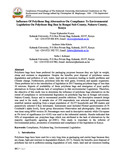Influence Of Polythene Bag Alternatives On Compliance To Environmental Legislation On Polythene Bag Ban In Rongai Sub-County, Nakuru County, Kenya

View/
Date
2019-10-16Author
Koros, Victor Kipkemboi
Kitetu, Jackson John
Kebenei, Sella J.
Metadata
Show full item recordAbstract
Polythene bags have been preferred for packaging purposes because they are light in weight,
cheap and resistant to degradation. Despite the benefits, poor disposal of polythene causes
degradation and pollution of soil, water, land and air resources leading to health problems and
Climate change. Furthermore, polythene kills the wild game, livestock and aquatic organisms.
These problems led to the introduction of legislation in 2017 banning polythene bags of less than
30 microns. Reports of availability of these polythene bags and emergence of poor quality
alternatives in Kenya indicate lack of compliance to this environmental Legislation. Therefore,
the objective of this study was to determine the influence of polythene bags alternatives on the
extent of compliance to environmental legislation on polythene bag ban in Rongai sub-county,
Nakuru County, Kenya and to recommend possible solutions. The descriptive research design
was used in the study. A sample size of 259 respondents was selected using proportionate
stratified random sampling from a target population of 18,377 households and 580 traders and
purposively selected 6 Key informants. Instruments used included Piloted questionnaires (0.74
Polythene bags have been preferred for packaging purposes because they are light in weight,
cheap and resistant to degradation. Despite the benefits, poor disposal of polythene causes
degradation and pollution of soil, water, land and air resources leading to health problems and
Climate change. Furthermore, polythene kills the wild game, livestock and aquatic organisms.
These problems led to the introduction of legislation in 2017 banning polythene bags of less than
30 microns. Reports of availability of these polythene bags and emergence of poor quality
alternatives in Kenya indicate lack of compliance to this environmental Legislation. Therefore,
the objective of this study was to determine the influence of polythene bags alternatives on the
extent of compliance to environmental legislation on polythene bag ban in Rongai sub-county,
Nakuru County, Kenya and to recommend possible solutions. The descriptive research design
was used in the study. A sample size of 259 respondents was selected using proportionate
stratified random sampling from a target population of 18,377 households and 580 traders and
purposively selected 6 Key informants. Instruments used included Piloted questionnaires (0.74
Cronbach’s alpha level), focus group discussions Observation and photography. Data analysis
was done using SPSS version 20. Percentages were used in descriptive statistic while Chi-square
at 5% level of significance ((=0.05) was used in the inferential statistic. Results indicated that
50% of respondents use propylene bags which was attributed to the lack of alternatives by the
majority significantly agreeing (p<.0001). This study is important in the reforms of
Environmental policy, promotion of awareness and compliance of this legislation in Kenya.
